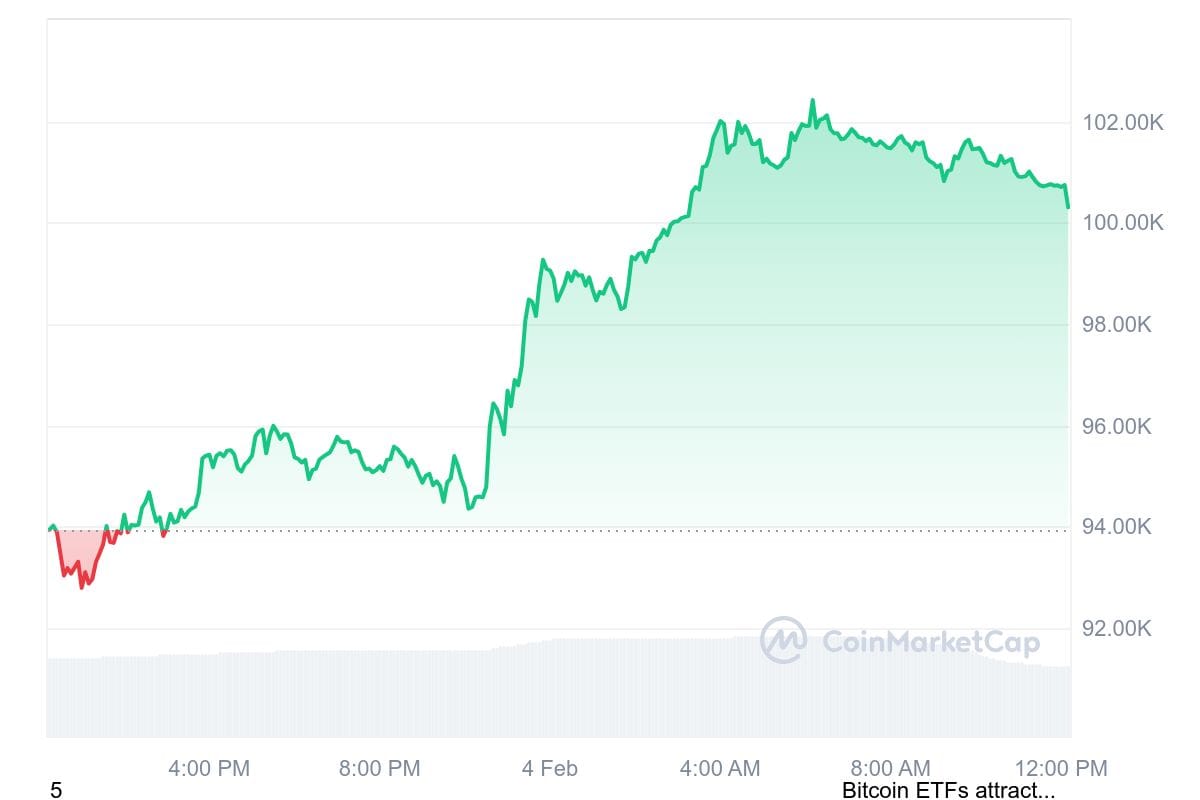Table of Contents
The crypto market staged a dramatic recovery today, reversing steep losses from yesterday’s rout triggered by US President Donald Trump’s tariff announcement over the weekend.
With a temporary reprieve in place after Mexico and Canada secured a one-month delay on new U.S. tariffs, Bitcoin and the broader market saw sharp rebounds.
Bitcoin Reclaims $100K Amid Policy Uncertainty
Bitcoin, which plummeted to $92,000 in the wake of Trump’s tariff threats, has surged 7.14% in the past 24 hours, now trading at around $101,000. Ethereum (ETH) saw an even stronger rebound, climbing 12% to $2,809.

Altcoins, which bore the brunt of yesterday’s sell-off, led the recovery – XRP soared 23.34%, while Cardano (ADA), Sui (SUI), Pepe (PEPE), Ondo (ONDO), Aptos (APT), and Mantle (MNT) each posted gains exceeding 20%.
The crypto market’s rebound mirrors the broader risk asset recovery seen in traditional equities. The S&P 500, which dropped to 5,920 on the tariff news, has since reclaimed the 6,000 level. This highlights the increasing correlation between crypto and macroeconomic developments, particularly those tied to US trade policy.
The Trump Trade: Volatility Returns to Markets
BRN analyst Valentin Fournier caleed the events over the past few days "Trump trading at its best."
"The rapid market swings following political maneuvers signal what could be a new era of volatility as Trump’s economic policies take shape in his second presidency," Fournier added.
With trade tensions still looming, crypto traders should brace for continued unpredictability in the coming months.
The temporary pause on tariffs was secured after Mexico’s President Claudia Sheinbaum agreed to deploy 10,000 National Guard troops to bolster border security. Canada’s Prime Minister Justin Trudeau also announced a $1.3 billion border security initiative. These moves delayed the 25% tariffs on Mexican and Canadian goods, but Trump’s 10% tariff on Chinese imports remains set to take effect as planned.
Crypto’s Growing Sensitivity to Global Trade Policy
The market’s response to the tariff developments underscores the increasing interplay between crypto and global trade policy. A similar market reaction was observed last week when Bitcoin dropped after stock market losses linked to China’s AI startup DeepSeek.
Over the past year, Bitcoin has shown sensitivity to US economic data releases, Federal Reserve policy shifts, and geopolitical developments, as the asset becomes increasingly correlated with traditional financial markets, reinforcing Bitcoin’s dual nature as both a speculative asset and an emerging alternative to traditional financial hedges. While Bitcoin has historically been viewed as a non-correlated asset, recent movements suggest that institutional adoption has tethered it more closely to broader economic forces.
What’s Next?
With a one-month deadline in place for further tariff negotiations, crypto traders will be watching upcoming trade talks closely.
Trump’s policy unpredictability means further volatility is likely. If a broader trade war emerges, crypto’s role as both a risk asset and an inflation hedge will be tested once again. For now, today’s rebound signals that the market remains resilient but whether this stability holds will depend on how the next phase of trade negotiations unfolds.









